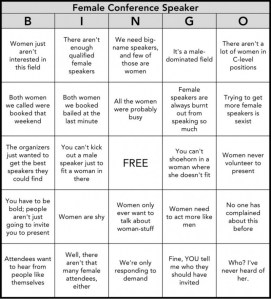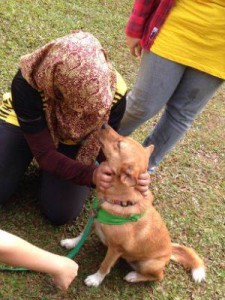Last weekend, I attended a conference entitled “Speaking in God’s name: Re-examining Gender in Islam”in London. Organized by Inspire, a Muslim women’s consultancy that aims to inspire and empower Muslim women. The purpose of the conference was to have a conversation about re-negotiating how we understand gender in Islam. The conference featured some big names, such as Amina Wadud, Ziba Mir-Hosseini, and Dr. Khalid Abou El Fadl, and Mukhtar Mai. The conference also launched the start of a new organization named “Jihad Against Violence UK.”
I had a conversation with Eleanor Kilory of Women Living Under Muslim Laws, Word Play of Word Play Blog, Basma Al Mutlaq of Saudi Amber, and Faeeza Vaid of Muslim Women’s Network UK about the conference. It’s a pretty long conversation, so the first part is today and we’ll finish up tomorrow.
Basma: The core idea behind the conference that is rightly named “Speaking in God’s Name” was to examine gender issues in the light of the emerging Islamic feminism as an alternative to the decades-long male interpretation of the religious texts that resulted in women becoming the sole bearers of Islam and the main victims of bigotry and discriminatory edicts and laws that weigh heavily on men’s side.
Sara: Overall, I enjoyed the conference, but the intended audience was never quite clear. The marketing of the conference led me to believe that the focus of the conference would be on tools for British Muslim community. However, while thought provoking, not many of the speakers really spoke about the U.K. context. I was mostly interested in this conference because I thought that it would be an exploration of the grass roots application of many of the conversations about gender and Islam in the classroom.
Basma: And although the main focus of the conference is gender and Islam, with themes of religious moderation and calls for the liberation of women from the shackles of regressive tribal tradition and patriarchal tyranny, it also addressed other issues. For example, the Muslim community in the U.K. and questions about gender mixing in mosques and the hyped question of “burqa or no burqa,” which sounded a bit of cliché amidst the more academic speeches of Dr. Ziba Mir-Hosseini and the prominent scholar professor Amina Wadud, who wrote extensively about fiqh and offers a female re-reading of the religious texts that have been interpreted by men for almost fourteen centuries.
Faeeza: I was initially impressed by the Inspire website and Sara Khan’s video, as it appeared to promote an incredible bringing together of minds which targeted grassroots women. However, as the only national Muslim women’s network, MWNUK had not been contacted directly about the event, and we heard through the grapevine about the event. We immediately contacted Inspire to congratulate their initiative, but also indicated that the excessive ticket price would make the event somewhat inaccessible to grassroots Muslim women.
Word Play: I was fully exposed to the discomfort felt by many Muslims in the community in the lead up to the event, which was as much amusing as it was perturbing. Rumour was that it was going to be a gathering of liberals. And of course the notion of liberalism in Islam evokes a real contagious response for many. I don’t think it was intended as a gathering of liberals as much as it was an attempt to challenge and trigger a sort of revolutionary thinking in the British Muslim scene about tackling patriarchy in Islamic interpretation. No easy task for any two-day conference, but I believe those who are interested or involved in such work were the intended target.
Eleanor: the majority of the speakers were academics, and I have heard them talk in academic conferences and am familiar with their discourse, but Inspire also offered “leading activists” who would “demonstrate how to translate progressive concepts into real and meaningful change on the ground”—a promise I feel they didn’t live up to, besides a moving and genuinely inspirational presentation “Using Film as a Tool for Women’s Empowerment” by filmmaker Samar Minallah (Pakistan). I felt it would have been more useful to tip the balance in favour of activists working at a community/grassroots level and look at how all that academic research and feminist re-interpretation of Islamic texts had filtered down and had been turned into strategic tools of education and awareness raising. I don’t want to belittle the efforts of the organizers or dismiss the grassroots work of some of the academics, but when you have a problem, it’s easy to call together scholarly experts to discuss that problem, and harder to gather those working on the ground facing the real problem of implementing it. Mukhtar Mai spoke too briefly, and there was little discussion of her work, but she explained how doors closed in her face when she started a door-to-door campaign to convince parents the value of educating their daughters, and now she has 700 girls in the schools she established.
Faeeza: Samar Minallah and Mukhtar Mai resonated more with the grassroots women in the audience. As someone with a deep interest in the areas of Islamic laws, gender, and authority, I was really looking forward to hearing them all speak. I enjoyed revisiting many of the ideas that are potentially incredibly useful to the development of Muslim women. However, what was missing was the vital bridging of the academic ideas to practical solutions in response to the problems Muslim women face in their realities. This was because there was not enough space given to discussing these realities, or enough practical solutions. Academia is not necessarily the problem, but the way it’s conveyed is. It HAS to be translated! Highlighting lived realities gives academic theories the opportunities to test their effectiveness.
Word Play: You can never re-examine gender under the Islamic context without the academics. But you can re-examine the language being used to bridge the workings of the two groups (grassroots and academic). The conference simply highlighted that these these two worlds are not rolling like a well-oiled wheel. No one should ever be made to feel disconnected with information especially information that can influence and change the rules of engagement in society.
Stay tuned tomorrow for the roundtable’s conclusion!













